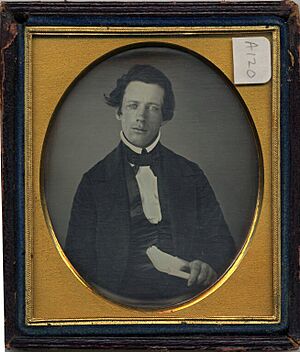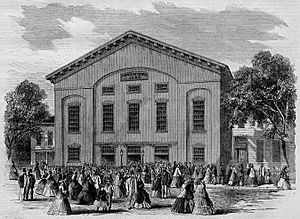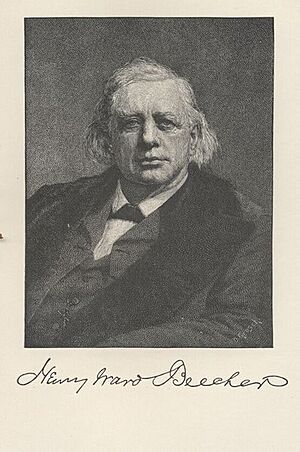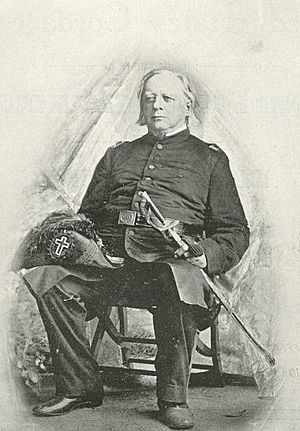Henry Ward Beecher facts for kids
Quick facts for kids
Henry Ward Beecher
|
|
|---|---|
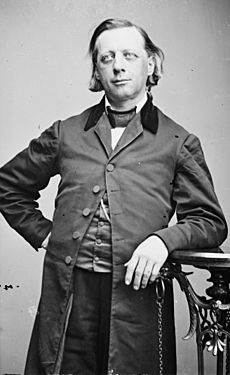
Beecher, between 1855 and 1865
|
|
| Born | June 24, 1813 |
| Died | March 8, 1887 (aged 73) Queens, New York, US
|
| Occupation |
|
| Spouse(s) |
Eunice White Beecher
(m. 1837) |
| Parent(s) |
|
| Signature | |
Henry Ward Beecher (born June 24, 1813 – died March 8, 1887) was an important American Congregationalist minister, social reformer, and speaker. He was famous for supporting the end of slavery. His ideas about God's love greatly influenced Christian beliefs that are still common today.
Henry was the son of Lyman Beecher, a well-known minister. Many of his brothers and sisters also became famous. His sister, Harriet Beecher Stowe, wrote the famous anti-slavery book Uncle Tom's Cabin. Henry studied at Amherst College and Lane Theological Seminary. After his studies, he became a minister in Indiana.
In 1847, Beecher became the first pastor of the Plymouth Church in Brooklyn, New York. He quickly became famous for his speeches. He used humor and everyday language, which was new for speakers at the time. He taught that God's love was the most important thing. He also became very interested in social changes, especially the movement to end slavery. Before the Civil War, he helped buy freedom for enslaved people. He also sent rifles, called "Beecher's Bibles", to people fighting slavery in Kansas. During the Civil War, he traveled in Europe to gain support for the Union.
After the war, Beecher continued to support social reforms. These included women's right to vote and the temperance movement (which encouraged people not to drink alcohol). He also believed that Charles Darwin's theory of evolution could fit with Christian beliefs. After his father died in 1863, Henry Ward Beecher was known as "the most famous preacher in the nation."
Contents
Early Life and Education
Henry Ward Beecher was born in Litchfield, Connecticut. He was one of 13 children. His father, Lyman Beecher, was a Presbyterian preacher. Henry's siblings included famous author Harriet Beecher Stowe and educators Catharine Beecher and Thomas K. Beecher. His mother, Roxana, died when Henry was three years old.
The Beecher family was not rich. Their home was a mix of fun and serious religious activities. They prayed a lot and listened to their father play the fiddle. Henry was thought to be a bit slow as a child and had a stammer (a speech difficulty). He sometimes got in trouble for not doing well in school.
At age 14, he started training to be a speaker at Mount Pleasant Classical Institute. There, he met Constantine Fondolaik Newell, who became his lifelong friend. They both went to Amherst College. During his time at Amherst, Henry realized he wanted to become a minister, even though he had once dreamed of going to sea.
He met his future wife, Eunice Bullard, and they got engaged in 1832. He also became interested in phrenology. This was a belief that you could tell a person's personality by the shape of their skull.
After graduating from Amherst in 1834, Beecher went to Lane Theological Seminary in Ohio. His father was the head of this seminary. Students at Lane had strong disagreements about slavery. Henry tried to stay out of the arguments, but he felt sympathy for the students who wanted slavery to end right away. He graduated in 1837.
Starting His Ministry
On August 3, 1837, Henry married Eunice Bullard. They moved to Lawrenceburg, Indiana, where Henry became a minister. He first gained national attention when he got involved in a split within the Presbyterian Church. This split was about old religious ideas and the issue of slavery.
Because of money problems after a financial crisis in 1837, Beecher looked for a new job. In 1839, he became the minister of the Second Presbyterian Church in Indianapolis. He was very popular because he used humor and informal language in his sermons. This was unusual for preachers back then. His church became the largest in the city.
In 1847, he accepted an invitation to lead a new church, the Plymouth Congregational Church in Brooklyn, New York. His fame continued to grow, and he became one of the most popular speakers in the country.
Henry Ward Beecher's ideas about religion changed over time. He started to focus on God's great love instead of human sin. He also believed that people should enjoy life, not just focus on being holy.
Working for Social Change
Fighting Slavery
Henry Ward Beecher became very active in social issues, especially the fight against slavery. He hated slavery from his seminary days. A key moment for him was in 1848 when he helped raise money to buy the freedom of two young enslaved girls. In 1856, he held a special event to raise money to free another young woman named Sarah.
Beecher strongly disagreed with the Compromise of 1850. This agreement tried to balance anti-slavery and pro-slavery groups. He especially disliked the part that made it harder for enslaved people to escape. He believed Christians had a duty to help and protect those who escaped slavery. He argued that slavery and freedom could not exist together.
In 1856, he supported John C. Frémont, the first presidential candidate for the Republican Party. During the conflict in Kansas Territory, known as "Bloody Kansas", Beecher raised money to send rifles to anti-slavery fighters. The newspapers called these weapons "Beecher's Bibles". Because of his strong anti-slavery actions, many people in the American South hated Beecher and he received many threats.
During the Civil War in 1863, President Abraham Lincoln asked Beecher to travel to Europe. His job was to speak and gain support for the Union. Beecher's speeches helped turn public opinion in Europe against the Confederate States of America. This helped prevent other countries from supporting the Confederacy. After the war ended in 1865, Beecher was asked to speak at Fort Sumter, where the war began. Lincoln chose him because he believed Beecher had helped make the Union victory possible.
Other Important Beliefs
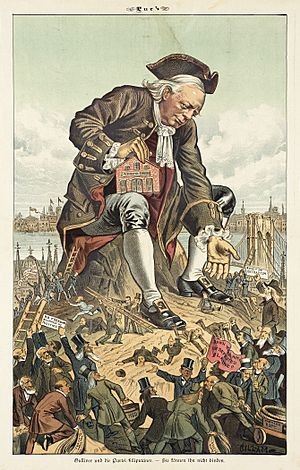
Beecher supported the temperance movement throughout his life. He also became a leader in the women's right to vote movement after the Civil War. In 1869, he was chosen as the first president of the American Woman Suffrage Association.
During the Reconstruction Era after the Civil War, Beecher agreed with President Andrew Johnson's plan to quickly bring the Southern states back into the Union. He believed that business leaders should guide society. He also supported Charles Darwin's theory of evolution in the 1880s. He felt that evolution fit with God's plan for progress. His speeches and writings helped more people in America accept the theory of evolution.
Beecher also spoke out for allowing Chinese immigrants to continue coming to the U.S. He argued that new groups of people were needed to do certain jobs.
Later Life and Lasting Impact
In 1871, Yale University started "The Lyman Beecher Lectureship," and Henry taught the first three courses. After facing high costs from a legal trial, Beecher went on a speaking tour to earn money. In 1884, he supported Democratic candidate Grover Cleveland for president. He traveled to England again in 1886 for more lectures.
Henry Ward Beecher had a stroke on March 6, 1887, and died two days later on March 8. Many people across the country were sad to hear of his death. He is buried in Green-Wood Cemetery in Brooklyn, New York.
His Legacy
Henry Ward Beecher's ideas about God's love are now a big part of mainstream Christianity in America. He was known for his positive attitude and his belief that things could always improve.
In 1929, the First Presbyterian Church in Lawrenceburg was renamed Beecher Presbyterian in his honor. A statue of Henry Ward Beecher was put up in Brooklyn in 1891.
He was also a writer. He edited an agricultural journal and contributed to a newspaper called The Independent. He also wrote a novel called Norwood, or Village Life in New England. His writings helped share his ideas with many people.
Images for kids
See also
 In Spanish: Henry Ward Beecher para niños
In Spanish: Henry Ward Beecher para niños
 | Percy Lavon Julian |
 | Katherine Johnson |
 | George Washington Carver |
 | Annie Easley |


